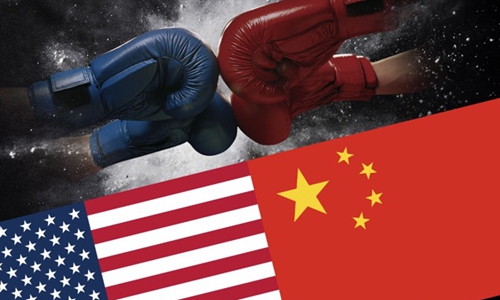Chinese students’ expulsion harms US R&D
By GT staff reporters Source:Global Times Published: 2020/5/31 23:03:40 Last Updated: 2020/5/31 20:03:40
Move likely to make talented PhD candidates return to China: researcher

China US Photo: GT
The White House announcement that it was shutting the door on thousands of Chinese graduate students and researchers would be a loss for the US, said Chinese experts and students involved, noting the policy not only destroyed their personal academic careers but also undermined US scientific research needs.
US President Donald Trump Friday local time issued a proclamation blocking certain Chinese students and scholars who "implement or support China's Military-Civil Fusion (MCF) strategy," from entering the country with F or J visas, citing concerns over China's use of graduate students to steal US technology, intellectual property and research, according to the White House website.
A more detailed list of affected schools was not provided, but a New York Times report indicated schools tied to the Chinese military, as well as the seven "traditional universities with longstanding ties to the military," which included the Beijing Institute of Technology, Harbin Engineering University and Nanjing University of Science and Technology.
More than 3,000 students could be affected, the New York Times reported, citing official estimates.
A PhD aerospace research student from a university among the seven who asked not to be named told the Global Times that his exchange project with a New York state university later this year, using a J1 visa, might be over.
"Chinese students and US research teams have two-sided communications. But the US government policy to close the door shows arrogance," he said.
Chinese students were not exposed to confidential technology or knowledge in the US, he said.
"We go abroad purely with the purpose of studying and progressing," the student said.
He predicted many Chinese scientists would come back to China, especially younger PhD students with potential.
Xiong Bingqi, a deputy director of the Shanghai-based 21st Century Education Research Institute, told the Global Times that globalization and openness was the general trend of education development.
"The US government seeks to run in a different direction," Xiong said.
"This will hurt its talent in education and research," Xiong noted.
The policy against Chinese students was just the latest act by the Trump administration amid China-US tensions over trade, the COVID-19 pandemic and Hong Kong.
"Were the US side to adopt measures harming Chinese students' legal rights and interests, it would be stark political persecution, racial discrimination and a grave violation of their human rights," Zhao Lijian, a spokesperson for the Ministry of Foreign Affairs, said at a press conference on Friday in response to a question about the US plan. As of 2019, China remained the largest source of international students in the US, Aljazeera reported.
Some 369,548 Chinese were studying in US undergraduate, graduate and non-degree programs in 2018/19, or 33.7 percent of all international students.
They contributed nearly $15 billion to the US economy in 2018, according to the Aljazeera report.
Posted in: DIPLOMACY